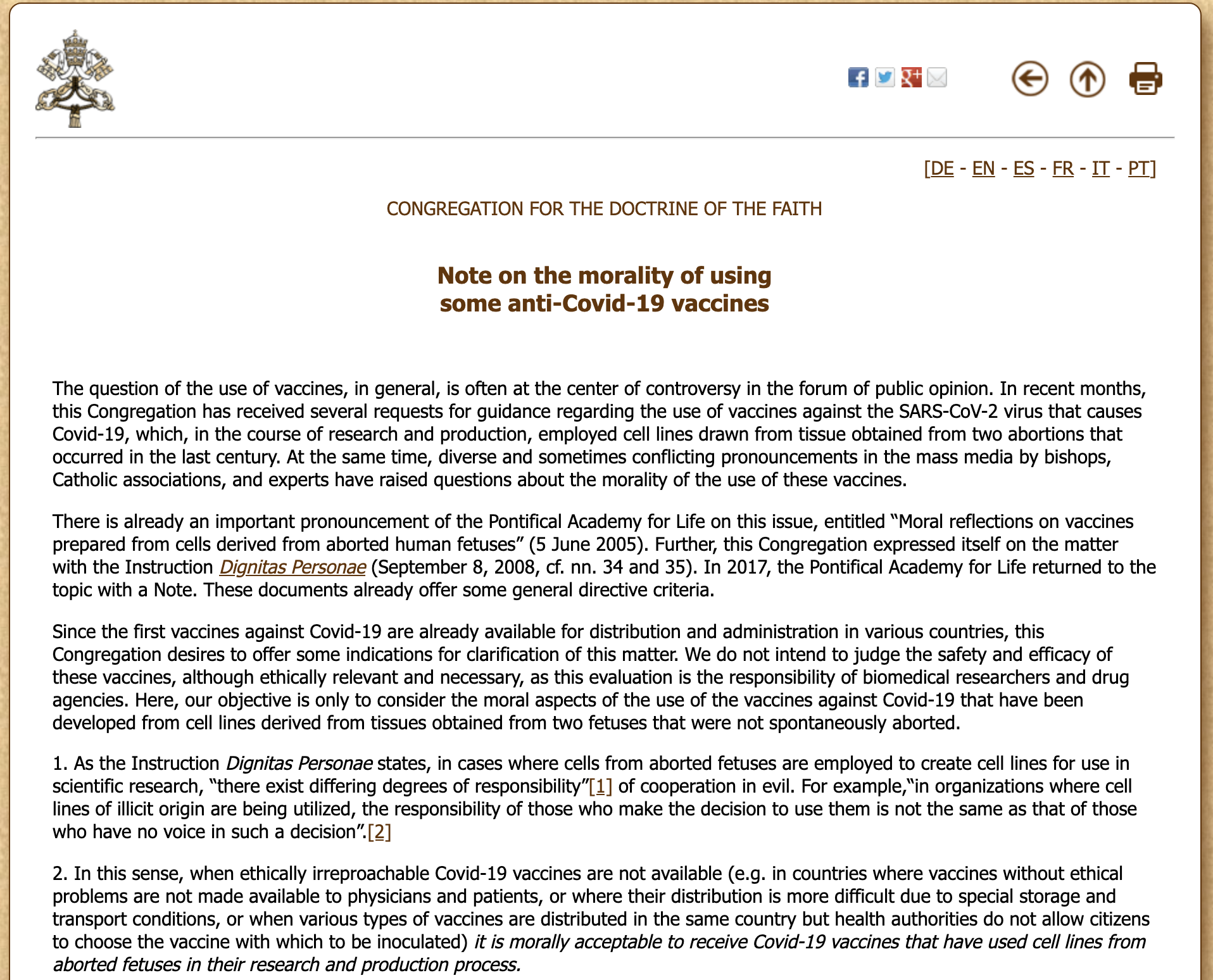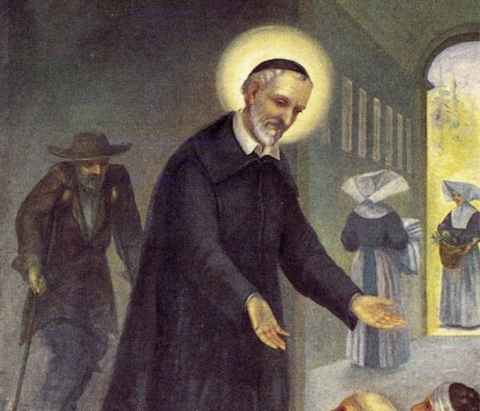CONGREGATION FOR THE DOCTRINE OF THE FAITH - Note on the morality of using some anti-Covid-19 vaccines

오클랜드 마이클 바버 주교님으로 부터 온 서안.
Dear Brother Priests, Deacons, Seminarians, Chancery, Cathedral and Parish Staff:
Attached please find the Diocese of Oakland Religious Exception Statement I issued earlier this week, in both English and Spanish.
Please ensure this material is widely distributed in your parishes.
Additional resources are available on the Vatican website.
Recursos adicionales disponibles en español en la página oficial del Vaticano:
With the assurance of my continued prayers and blessing, I am
Yours in Christ,
+Michael C. Barber, S.J.
Bishop of Oakland
2121 Harrison Street, Suite 100
Office direct: 510-267-8316
----------------------------------------------------------------------
CONGREGATION FOR THE DOCTRINE OF THE FAITH
Note on the morality of using
some anti-Covid-19 vaccines
The question of the use of vaccines, in general, is often at the center of controversy in the forum of public opinion. In recent months, this Congregation has received several requests for guidance regarding the use of vaccines against the SARS-CoV-2 virus that causes Covid-19, which, in the course of research and production, employed cell lines drawn from tissue obtained from two abortions that occurred in the last century. At the same time, diverse and sometimes conflicting pronouncements in the mass media by bishops, Catholic associations, and experts have raised questions about the morality of the use of these vaccines.
There is already an important pronouncement of the Pontifical Academy for Life on this issue, entitled “Moral reflections on vaccines prepared from cells derived from aborted human fetuses” (5 June 2005). Further, this Congregation expressed itself on the matter with the Instruction Dignitas Personae (September 8, 2008, cf. nn. 34 and 35). In 2017, the Pontifical Academy for Life returned to the topic with a Note. These documents already offer some general directive criteria.
Since the first vaccines against Covid-19 are already available for distribution and administration in various countries, this Congregation desires to offer some indications for clarification of this matter. We do not intend to judge the safety and efficacy of these vaccines, although ethically relevant and necessary, as this evaluation is the responsibility of biomedical researchers and drug agencies. Here, our objective is only to consider the moral aspects of the use of the vaccines against Covid-19 that have been developed from cell lines derived from tissues obtained from two fetuses that were not spontaneously aborted.
1. As the Instruction Dignitas Personae states, in cases where cells from aborted fetuses are employed to create cell lines for use in scientific research, “there exist differing degrees of responsibility”[1] of cooperation in evil. For example,“in organizations where cell lines of illicit origin are being utilized, the responsibility of those who make the decision to use them is not the same as that of those who have no voice in such a decision”.[2]
2. In this sense, when ethically irreproachable Covid-19 vaccines are not available (e.g. in countries where vaccines without ethical problems are not made available to physicians and patients, or where their distribution is more difficult due to special storage and transport conditions, or when various types of vaccines are distributed in the same country but health authorities do not allow citizens to choose the vaccine with which to be inoculated) it is morally acceptable to receive Covid-19 vaccines that have used cell lines from aborted fetuses in their research and production process.
3. The fundamental reason for considering the use of these vaccines morally licit is that the kind of cooperation in evil (passive material cooperation) in the procured abortion from which these cell lines originate is, on the part of those making use of the resulting vaccines, remote. The moral duty to avoid such passive material cooperation is not obligatory if there is a grave danger, such as the otherwise uncontainable spread of a serious pathological agent[3]--in this case, the pandemic spread of the SARS-CoV-2 virus that causes Covid-19. It must therefore be considered that, in such a case, all vaccinations recognized as clinically safe and effective can be used in good conscience with the certain knowledge that the use of such vaccines does not constitute formal cooperation with the abortion from which the cells used in production of the vaccines derive. It should be emphasized, however, that the morally licit use of these types of vaccines, in the particular conditions that make it so, does not in itself constitute a legitimation, even indirect, of the practice of abortion, and necessarily assumes the opposition to this practice by those who make use of these vaccines.
4. In fact, the licit use of such vaccines does not and should not in any way imply that there is a moral endorsement of the use of cell lines proceeding from aborted fetuses.[4] Both pharmaceutical companies and governmental health agencies are therefore encouraged to produce, approve, distribute and offer ethically acceptable vaccines that do not create problems of conscience for either health care providers or the people to be vaccinated.
5. At the same time, practical reason makes evident that vaccination is not, as a rule, a moral obligation and that, therefore, it must be voluntary. In any case, from the ethical point of view, the morality of vaccination depends not only on the duty to protect one's own health, but also on the duty to pursue the common good. In the absence of other means to stop or even prevent the epidemic, the common good may recommend vaccination, especially to protect the weakest and most exposed. Those who, however, for reasons of conscience, refuse vaccines produced with cell lines from aborted fetuses, must do their utmost to avoid, by other prophylactic means and appropriate behavior, becoming vehicles for the transmission of the infectious agent. In particular, they must avoid any risk to the health of those who cannot be vaccinated for medical or other reasons, and who are the most vulnerable.
6. Finally, there is also a moral imperative for the pharmaceutical industry, governments and international organizations to ensure that vaccines, which are effective and safe from a medical point of view, as well as ethically acceptable, are also accessible to the poorest countries in a manner that is not costly for them. The lack of access to vaccines, otherwise, would become another sign of discrimination and injustice that condemns poor countries to continue living in health, economic and social poverty.[5]
The Sovereign Pontiff Francis, at the Audience granted to the undersigned Prefect of the Congregation for the Doctrine of the Faith, on 17 December 2020, examined the present Note and ordered its publication.
Rome, from the Offices of the Congregation for the Doctrine of the Faith, on 21 December 2020, Liturgical Memorial of Saint Peter Canisius.
| Luis F. Card. Ladaria, S.I. | + S.E. Mons. Giacomo Morandi |
| Prefect | Titular Archbishop of Cerveteri |
| Secretary |
[1] Congregation for the Doctrine of the Faith, Instruction Dignitas Personae (8 th December 2008), n. 35; AAS (100), 884.
[3] Cfr. Pontifical Academy for Life, “Moral reflections on vaccines prepared from cells derived from aborted human foetuses”, 5th June 2005.
[4] Congregation for the Doctrine of the Faith, Instruct. Dignitas Personae, n. 35: “When the illicit action is endorsed by the laws which regulate healthcare and scientific research, it is necessary to distance oneself from the evil aspects of that system in order not to give the impression of a certain toleration or tacit acceptance of actions which are gravely unjust. Any appearance of acceptance would in fact contribute to the growing indifference to, if not the approval of, such actions in certain medical and political circles”.
[5] Cfr. Francis, Address to the members of the "Banco Farmaceutico" foundation, 19 September 2020.
기사제공: 안기민 신부
-----------------------------------------------------------
번역: 구글 번역기
신앙교리성
일부 코로나19 백신 대한 사용 도덕에 참고 사항
일반적으로 백신 사용에 대한 문제는 종종 여론 포럼에서 논쟁의 중심에 있습니다. 최근 몇 달 동안 이 성에서는 연구 및 생산 과정에서 두 가지 조직에서 추출한 세포주를 사용하는 Covid-19를 유발하는 SARS-CoV-2 바이러스에 대한 백신 사용에 관한 지침에 대한 여러 요청을 받았습니다. 지난 세기에 일어난 낙태. 동시에 주교, 가톨릭 협회 및 전문가들이 대중 매체에서 다양하고 때로는 상충되는 선언을 함으로써 이러한 백신 사용의 도덕성에 의문을 제기했습니다.
이 문제에 대한 교황청 생명 아카데미의 중요한 선언이 이미 "낙태된 인간 태아에서 유래한 세포로 제조된 백신에 대한 도덕적 성찰"(2005년 6월 5일)이라는 제목의 중요한 선언이 있습니다. 더 나아가, 이 수녀회는 Dignitas Personae 훈령(2008년 9월 8일, cf. nn. 34 및 35)으로 이 문제에 대해 표명했습니다. 2017년에 교황청 생명 아카데미는 메모와 함께 주제로 돌아갔습니다. 이 문서는 이미 몇 가지 일반적인 지침 기준을 제공합니다.
Covid-19에 대한 첫 번째 백신이 이미 여러 국가에서 배포 및 관리가 가능하기 때문에 이 수도성은 이 문제를 명확히 하기 위한 몇 가지 징후를 제공하고자 합니다. 윤리적으로 적절하고 필요하지만 이 평가는 생물의학 연구원 및 의약품 기관의 책임이기 때문에 우리는 이러한 백신의 안전성과 효능을 판단할 의도가 없습니다. 여기에서 우리의 목표는 자연 유산되지 않은 두 태아에서 얻은 조직에서 파생된 세포주에서 개발된 Covid-19에 대한 백신 사용의 도덕적 측면만을 고려하는 것입니다.
1. 지침 Dignitas Personae에 명시된 바와 같이, 낙태된 태아의 세포를 사용하여 과학 연구에 사용할 세포주를 만드는 경우, 악에 대한 협력에 대해 "책임의 정도가 다릅니다"[1]. 예를 들어, "불법 기원의 세포주가 이용되고 있는 조직에서, 이를 사용하기로 결정한 사람들의 책임은 그러한 결정에 대해 발언권이 없는 사람들의 책임과 동일하지 않습니다."[2]
2. 이런 의미에서 윤리적으로 문제가 없는 코로나19 백신을 구할 수 없는 경우(예: 윤리적 문제가 없는 백신이 의사와 환자에게 제공되지 않거나 특수한 보관 및 운송 조건으로 인해 배포가 더 어려운 국가) 같은 국가에서 다양한 유형의 백신이 배포되지만 보건 당국이 시민들이 접종할 백신을 선택하도록 허용하지 않는 경우) 연구에 낙태된 태아의 세포주를 사용한 코로나19 백신을 받는 것이 도덕적으로 허용되며, 생산 과정.
3. 이 백신의 사용을 도덕적으로 합법화하는 것을 고려하는 근본적인 이유는 이러한 세포주가 유래한 낙태에 대한 악의 협력(수동적 물질적 협력)의 종류가 생성된 백신을 사용하는 쪽에 있기 때문입니다. , 원격. 심각한 병리학 적 병원체의 확산을 억제 할 수없는 심각한 위험이있는 경우 그러한 수동적 인 물질적 협력을 피하는 도덕적 의무는 의무가 아닙니다. [3]이 경우 SARS-CoV-2 바이러스의 전염병 확산 그것이 코비드-19를 유발합니다. 따라서 그러한 경우에 임상적으로 안전하고 효과적인 것으로 인정된 모든 백신은 그러한 백신의 사용이 낙태에 사용된 세포의 공식적인 협력을 구성하지 않는다는 특정 지식을 가지고 선의로 사용할 수 있다는 점을 고려해야 합니다. 백신 생산이 파생됩니다. 그러나 이러한 유형의 백신을 도덕적으로 합법적으로 사용하는 특정 조건에서 그 자체로 낙태 관행을 간접적으로라도 합법화하는 것은 아니며 필연적으로 낙태에 대한 반대를 가정한다는 점을 강조해야 합니다. 이 백신을 사용하는 사람들에 의해 실행됩니다.
4. 사실, 그러한 백신의 합법적인 사용은 낙태된 태아에서 유래하는 세포주의 사용에 대한 도덕적 지지가 있다는 것을 의미하지 않으며 어떤 식으로든 의미해서는 안 됩니다.[4] 따라서 제약 회사와 정부 보건 기관은 의료 제공자나 예방 접종을 받는 사람들에게 양심의 문제를 일으키지 않는 윤리적으로 허용되는 백신을 생산, 승인, 배포 및 제공하는 것이 좋습니다.
5. 동시에, 예방접종은 원칙적으로 도덕적 의무가 아니므로 자발적이어야 한다는 것이 실천적 이유에 의해 명백해집니다. 어쨌든 윤리적인 관점에서 볼 때 예방접종의 도덕성은 자신의 건강을 보호할 의무뿐만 아니라 공동선을 추구할 의무에도 달려 있습니다. 전염병을 막거나 예방할 수 있는 다른 수단이 없는 경우 공익은 특히 가장 약하고 가장 많이 노출된 사람들을 보호하기 위해 백신 접종을 권장할 수 있습니다. 그러나 양심상의 이유로 유산된 태아의 세포주로 생산된 백신을 거부하는 사람들은 다른 예방 수단과 적절한 행동을 통해 감염원의 전염 매개체가 되지 않도록 최선을 다해야 합니다. 특히 의학적 또는 기타 이유로 예방 접종을 받을 수 없는 사람들과 가장 취약한 사람들의 건강에 대한 위험을 피해야 합니다.
6. 마지막으로, 제약 산업, 정부 및 국제 기구가 의학적 관점에서 효과적이고 안전하며 윤리적으로 허용되는 백신을 가장 빈곤한 국가에서도 사용할 수 있도록 해야 하는 도덕적 의무도 있습니다. 그들에게 비용이 들지 않는 방식. 그렇지 않으면 백신에 대한 접근성의 부족은 가난한 국가들이 건강, 경제적, 사회적 빈곤 속에서 계속 살아가도록 비난하는 차별과 불의의 또 다른 신호가 될 것입니다.[5]
2020년 12월 17일, 프란치스코 교황은 아래에 서명한 신앙교리성 장관의 알현에서 이 메모를 검토하고 출판을 명령했습니다.
로마, 2020년 12월 21일 성 베드로 카니시우스 전례 기념식에서 신앙교리성 사무실에서.
----------------------
읽어보면 코비드19 백신에 이해를 더해 줄수있는 다른 기사: https://www.nebraskamed.com/COVID/you-asked-we-answered-do-the-covid-19…
- 125 views


